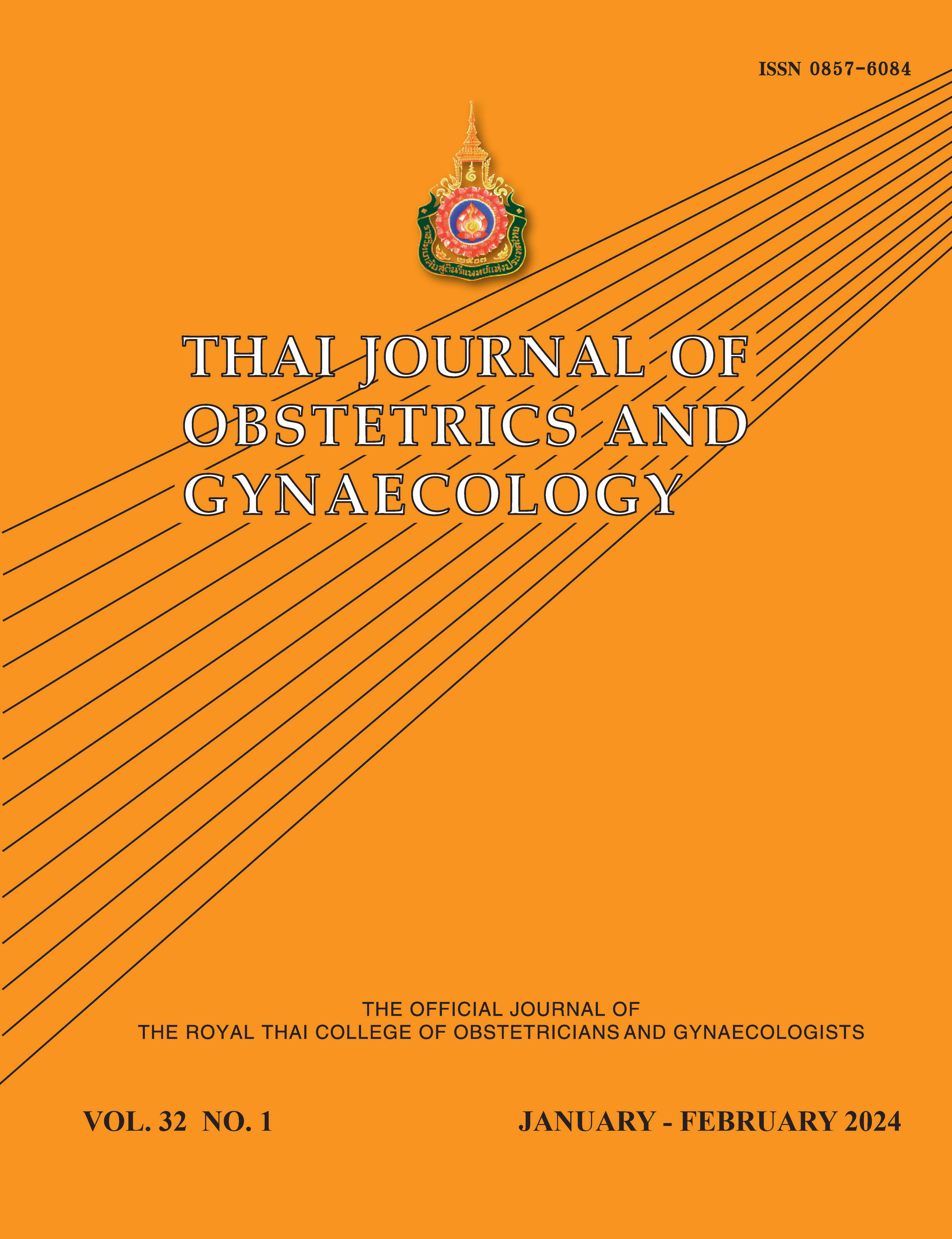Effect of Preoperative Walking Exercise on Postoperative Bowel Function in Patients with Major Gynecological Surgery: A randomized clinical trial
Main Article Content
Abstract
Objectives: To investigate the relationship between preoperative walking exercise and postoperative bowel function in patients undergoing major gynecological surgery.
Materials and Methods: This randomized trial was conducted between July 2022 and January 2023 and included patients who underwent major gynecological surgery. All patients received a standard of care followed by enhanced recovery after surgery protocols. In addition, patients in the exercise group performed 30 minutes of mild intensity walking exercise (at 30% of their maximal heart rate) twice before surgery.
Results: Of the 42 enrolled patients, 17 and 18 patients from the exercise and control group were analyzed, respectively. There were no significant differences in characteristics between the groups. Time to first tolerance of an oral diet did not differ significantly between the groups (22.0 ± 5.9 hours in the exercise group vs 26.3 ± 10.3 hours in the control group, p = 0.144), and neither did time to first achievement of normoactive bowel sound or length of hospital stay. However, patients with an estimated blood loss greater than 1,000 mL had benefit from the intervention, with a shorter time required to tolerate an oral diet (20.0 ± 1.4 hours vs 45.5 ± 3.5 hours, p = 0.011).
Conclusion: There is still insufficient data to encourage routine preoperative walking exercise before surgery in patients with benign gynecological conditions. However, preoperative walking exercise may be beneficial for patients who are at high risk of extensive blood loss during surgery.
Article Details

This work is licensed under a Creative Commons Attribution-NonCommercial-NoDerivatives 4.0 International License.
References
Johnson MD, Walsh RM. Current therapies to shorten postoperative ileus. Cleve Clin J Med 2009;76:641-8.
Boeckxstaens GE, de Jonge WJ. Neuroimmune mechanisms in postoperative ileus. Gut 2009;58: 1300-11.
Vather R, Trivedi S, Bissett I. Defining postoperative ileus: results of a systematic review and global survey. J Gastrointest Surg 2013;17:962-72.
Fujita K, Nagano T, Suzuki A, Sakakibara A, Takahashi S, Hirano T, et al. Incidence of postoperative ileus after paraaortic lymph node dissection in patients with malignant gynecologic tumors. Int J Clin Oncol 2005;10:187-90.
Bakkum-Gamez JN, Langstraat CL, Martin JR, Lemens MA, Weaver AL, Allensworth S, et al. Incidence of and risk factors for postoperative ileus in women undergoing primary staging and debulking for epithelial ovarian carcinoma. Gynecol Oncol 2012;125:614-20.
Li ZL, Zhao BC, Deng WT, Zhuang PP, Liu WF, Li C, et al. Incidence and risk factors of postoperative ileus after hysterectomy for benign indications. Int J Colorectal Dis 2020;35:2105-12.
Wolff BG, Viscusi ER, Delaney CP, Du W, Techner L. Patterns of gastrointestinal recovery after bowel resection and total abdominal hysterectomy: pooled results from the placebo arms of alvimopan phase III North American clinical trials. J Am Coll Surg 2007;205:43-51.
Ay AA, Kutun S, Ulucanlar H, Tarcan O, Demir A, Cetin A. Risk factors for postoperative ileus. J Korean Surg Soc 2011;81:242-9.
Nelson G, Bakkum-Gamez J, Kalogera E, Glaser G, Altman A, Meyer LA, et al. Guidelines for perioperative care in gynecologic/oncology: Enhanced Recovery After Surgery (ERAS) Society recommendations-2019 update. Int J Gynecol Cancer 2019;29:651-68.
Özdemir İA, Comba C, Demirayak G, Gülseren V, Erdogan SV, Aslanova F, et al. Impact of pre-operative walking on post-operative bowel function in patients with gynecologic cancer. Int J Gynecol Cancer 2019;29:1311-6.
Neufer PD, Young AJ, Sawka MN. Gastric emptying during walking and running: effects of varied exercise intensity. Eur J Appl Physiol Occup Physiol 1989;58: 440-5.
Kim HS, Park DH, Kim JW, Jee MG, Baik SK, Kwon SO, et al. Effectiveness of walking exercise as a bowel preparation for colonoscopy: a randomized controlled trial. Am J Gastroenterol 2005;100: 1964-9.
Karvonen MJ, Kentala E, Mustala O. The effects of training on heart rate; a longitudinal study. Ann Med Exp Biol Fenn 1957;35:307-15.
Singer P, Blaser AR, Berger MM, Alhazzani W, Calder PC, Casaer MP, et al. ESPEN guideline on clinical nutrition in the intensive care unit. Clin Nutr 2019;38:48-79.
Peng LH, Wang WJ, Chen J, Jin JY, Min S, Qin PP. Implementation of the pre-operative rehabilitation recovery protocol and its effect on the quality of recovery after colorectal surgeries. Chin Med J 2021;134:2865-73.
Harris WJ. Early complications of abdominal and vaginal hysterectomy. Obstet Gynecol Surv 1995;50:795-805.
Jansen SM, Ghatalia D, Mayo A, Lokke A, Petersen TR, Serna-Gallegos T, et al. Factors associated with increased estimated blood loss and factors associated with utilization of type and screen in benign gynecology: A retrospective chart review. Urogynecology (Phila) 2023;29:195-201.
Jernigan AM, Chen CC, Sewell C. A randomized trial of chewing gum to prevent postoperative ileus after laparotomy for benign gynecologic surgery. Int J Gynaecol Obstet 2014;127:279-82.


